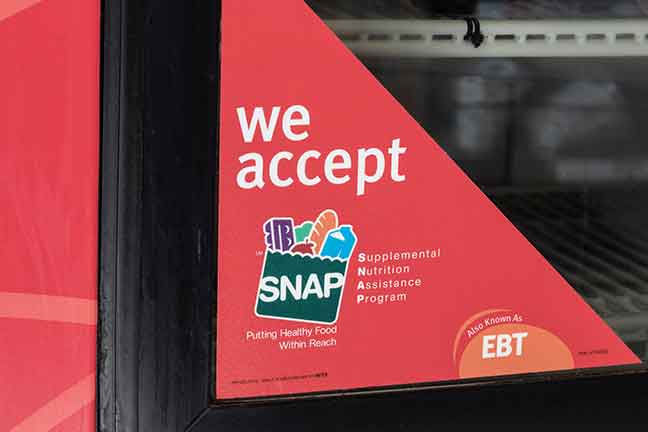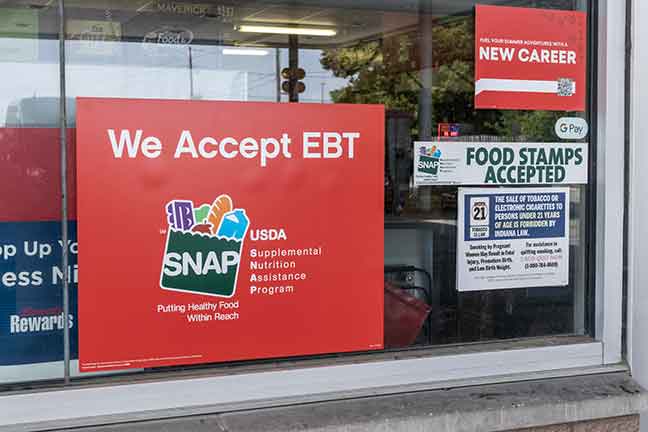So, can you and your partner get separate SNAP benefits if you’re not married? It’s possible, but there are specific conditions.
If you and your partner live together but maintain separate finances and prepare your meals separately, you may be eligible for individual SNAP benefits.
It’s all about showing that you’re financially independent from one another, even under the same roof.
What is SNAP and Who Can Benefit From It?
Do you know about SNAP and how it supports American families? The Supplemental Nutrition Assistance Program (SNAP), formerly known as the Food Stamp program, is designed to help families and individuals with low incomes afford nutritious food.
If you’re finding it hard to make ends meet at the grocery store, SNAP could be a helping hand you need. This program is all about providing nutritional support to those who need it the most.
What Are the SNAP Eligibility Requirements?
Are you wondering if you’re eligible for SNAP? To qualify for SNAP benefits, applicants must meet certain criteria, which typically include income limits, employment requirements, and residency status. Each state has specific guidelines within the federal framework, so it’s important to check the details of where you live. Understanding these requirements is the first step to accessing SNAP benefits and making sure you have the resources for healthy food.
How Does SNAP Define a Household?
What does SNAP consider a household? There are two groups of households to consider:
- Separate SNAP Household
- Same SNAP Household
What is a Separate Snap Household?’
“Separate SNAP Household” is defined by the Supplemental Nutrition Assistance Program as individuals who live under the same roof but do not share meals or food expenses. This classification allows roommates, tenants, or unmarried couples who maintain independent financial and food preparation practices to potentially receive individual SNAP benefits.
For those who are not married but live together, it’s essential to demonstrate to SNAP authorities that each person is buying and preparing food separately, often requiring separate grocery receipts or distinct meal preparation areas to qualify.
This setup can lead to each individual receiving their own set of benefits, calculated based on their singular financial situation, rather than as a combined household income and expense.
What is a Same Snap Household?
A “Same SNAP Household” is determined by the criteria that individuals live together and share meals or food expenses, essentially operating as a single economic unit when it comes to food consumption. This is the typical situation for families or couples who combine their income to purchase food and prepare meals together.
In SNAP’s eyes, these individuals are part of one household, and their benefits are calculated based on the total household income and size.
If you and another person, such as a spouse or a family member, buy food together and share meals, you are considered a ‘same household’ for SNAP purposes. This means your SNAP benefits will be jointly determined, which could be more or less beneficial depending on your specific financial situation.
How Does Preparing Food Separately Impact SNAP Benefits?
Why does preparing food separately matter for SNAP? If you’re not married and apply for SNAP, one of the key factors is whether you purchase and prepare food separately from your housemate or partner. This can affect your eligibility for separate SNAP accounts. So, if you and your partner handle your groceries and cook your own food independently, this should be communicated in your SNAP application.
How Can Shared Custody Affect SNAP Benefits?
What if you share custody of a child? Shared custody can influence SNAP eligibility and benefit levels. It’s all about where the child spends most of their time and where the majority of their meals are provided. If you’re sharing custody and both parents need assistance, this can be a bit complex, and you might need to provide additional documentation during your SNAP application process.
What Documentation Do You Need for SNAP Applications?
What kind of paperwork will you need for your SNAP application? If you’re applying for SNAP, be prepared to provide proof of income, expenses, and your living situation. Documents like pay stubs, rent agreements, and utility bills can all play a part in proving your eligibility.
It’s essential to have all your documentation to make the application process as smooth as possible.
Click here to find the SNAP office in your state.
What Are Some Common Misunderstandings About SNAP/ Food Stamps?
Are there myths about SNAP benefits you’ve heard? There are plenty of misconceptions about SNAP, especially regarding eligibility and benefits for unmarried couples. For example, some might think that living together automatically disqualifies you from receiving individual benefits, which isn’t always the case. It’s important to get the facts straight so you can take full advantage of the help available.
How Can Financial Independence Affect SNAP Food Stamp Benefits?
Why is financial independence important for SNAP?
For unmarried couples, proving financial independence is key to showing proof of a separate household situation and being eligible to potentially receive food stamps separately. This means having separate bank accounts, not sharing food costs, and generally managing your finances without relying on each other. Demonstrating this separation can make all the difference in your SNAP application.
Where Can You Find Additional SNAP Resources and Support?
Looking for more information or assistance with SNAP? There’s plenty of help out there, from the USDA’s SNAP website to local community organizations. These resources can guide you through the application process, answer any questions you might have, and provide support if you run into challenges.
Access Food Banks
Looking for more help beyond your SNAP benefits? You’re in luck because SNAP qualification opens the door to numerous other assistance opportunities. A fantastic resource is FindHelp.org, where you can locate nearby food banks. Just show your SNAP rewards letter, and you could get additional food supplies to help stretch your monthly budget. And that’s not all—being on SNAP often qualifies you for other government assistance programs, offering even more financial support.
Get FREE Monthly Cell Phone and Data Service
For instance, the Lifeline and ACP Programs are designed to ease the cost of communication services. Lifeline can significantly lower your phone bills, and the ACP program can help reduce internet service costs. These savings are crucial, as every dollar counts when you’re managing a tight budget.
Now for the best part: EASY Wireless.
When you qualify through EASY Wireless for Lifeline and ACP based on your SNAP eligibility, you’re looking at some serious perks.
We’re talking FREE Unlimited Talk, Text, and Data every month—keeping you connected without the financial strain.
And get this: if you and your housemate qualify as separate households for SNAP, you both might be eligible for Lifeline and ACP, doubling down on your savings. So, not only can you ensure your pantry is stocked, but you can also keep your phone and internet bills to a minimum.
That’s more money in your pocket for life’s other essentials or even a rainy day fund. With EASY Wireless, you’re not just saving money—you’re upgrading your lifestyle.
Click to learn about the Lifeline and ACP program benefits with EASY Wireless.
Apply for SNAP Benefits Today
Obtaining SNAP benefits as an unmarried couple living together is all about understanding the rules and demonstrating your living and financial situation accurately. With the right information and preparation, you can ensure that you receive the benefits to which you’re entitled.
If you’re ever in doubt, don’t hesitate to reach out to local resources or SNAP offices for guidance. Remember, the goal of SNAP is to help you afford the nutritious food you need, so make sure to take the steps needed to secure this vital assistance.





